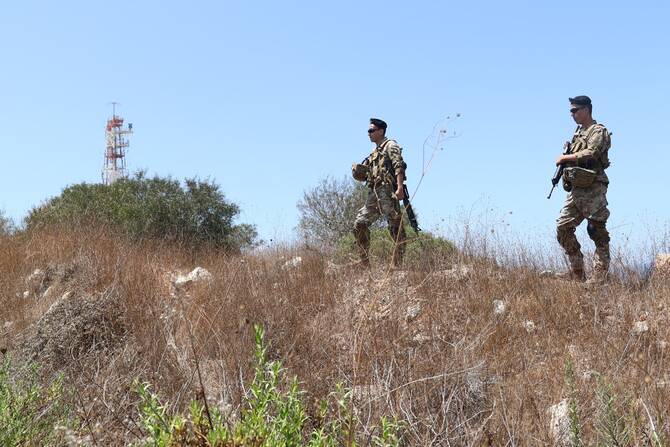LONDON: Hezbollah and Iran are preventing Lebanon from enacting badly needed reforms to emerge from political, social and financial crises, Ziad Majed, associate professor and program coordinator for Middle East pluralities at the American University of Paris, said on Friday.
Iran “is contributing to conflicts in the region, thus opening Lebanon as a theater to many of the terrible events of the region,” Majed said during a virtual panel discussion organized by the Council for Arab-British Understanding and attended by Arab News.
Alia Moubayed, a financial analyst, said the dysfunctional political system has contributed to Lebanon’s financial issues.
“The existential nature of (this) crisis stems from the fact that it’s a multipronged crisis. It’s a balance-of-payments crisis … It’s also a debt crisis. Lebanon’s debt has been above 140 percent for decades, and most recently it has just continued to edge up. We got to a point where this debt became increasingly unsustainable, leading to basically a debt default,” she added.
“It’s also a banking crisis. The banking system was attracting capital from abroad and offering exorbitant returns at risk of not being paid, to the extent that up to 75 percent of the assets of banks were exposed to the sovereign and Central Bank risk. All the money in dollars amounted to more $120 billion; the Central Bank, not being able to print dollars, was unable to give (funds) back.”
Moubayed said this is having serious social impacts on ordinary Lebanese. “Per capita income more than halved in less than a year. Almost 80 percent of the value of the currency has been lost,” she added.
“This obviously led to hyperinflation — more than 120 percent. That’s really wiping out the savings of Lebanese (people) but also undermining many livelihoods, particularly for the poor. Poverty rates exceed 50 percent, compared to 37 percent in 2019.
“There was also the horrible explosion that happened at the heart of the Beirut port, which deepened contraction of GDP (gross domestic product). The economy is really reeling.”
Ziad Abdel Samad, executive director of the Arab NGO Network for Development, said the Aug. 4 blast was a pivotal moment for the country — symbolic as well as material.
“The Beirut blast … was the manifestation of the government’s failure. Both corruption and negligence disabled the main agencies from doing their jobs properly,” he added.
Moubayed said: “We find ourselves with a lack of willingness, competence and … ability to move the country on a virtuous path. It’s being thwarted by the political elite because somebody has to bear the brunt of these losses. That means those who benefited for most of this time … are now trying to avoid this overhaul.”
Majed agreed, saying: “In this kind of configuration, it’s extremely difficult to modify electoral law, to modify the concept of the power-sharing formula, and to talk about a citizenship that’s capable, through its creativity and activism, to reconstruct a new Lebanon or political system.”
He added: “If you combine with that the whole financial management or all the economic crises and the current terrible situation, you have a country that’s just pushing some of its people to leave, and that’s terrible.”
Abdel Samad, though, suggested a complete rethink of social and economic approaches in Lebanon, based on “creating a big coalition” to “adopt an urgent reform agenda” and “recover the state and stolen assets” from the political elite.
“It’s easy to see the collapse of Lebanon will create serious threats to the region. Lebanon is hosting more than 1 million Syrian refugees and around 500,000 officially registered Palestinian refugees,” he said.
“It’s important to underline that any external pressure and functions can help, but won’t have the expected result unless they rely on a strong local movement able to break the status quo and lead the nation to real changes.”
Moubayed said if political change happens, a roadmap exists to solve Lebanon’s financial issues.
“We need a capital control law that would reduce the leakages out of the system. Another immediate action would be a rationalization of the costly subsidy system that isn’t benefitting those who need it,” she added.
“In addition to these measures, we need to approach the crisis in a comprehensive way — solid debt restructuring that would address the unsustainability of public finances.
“The second pillar of the approach would be the restructuring of the banking system in order to put back the financial sector to its right size, because it’s clearly an oversized system that the society and economy can’t sustain, but also (there would need to be) stronger regulation.
“The third (pillar) would be a strong social protection system that Lebanon has been lacking. Clearly the whole structure of governance (needs) reform. I don’t think Lebanese citizens are willing to undergo more pain if we don’t establish a system of good governance based on an independent judiciary … strong accountability (and) transparency.”
























